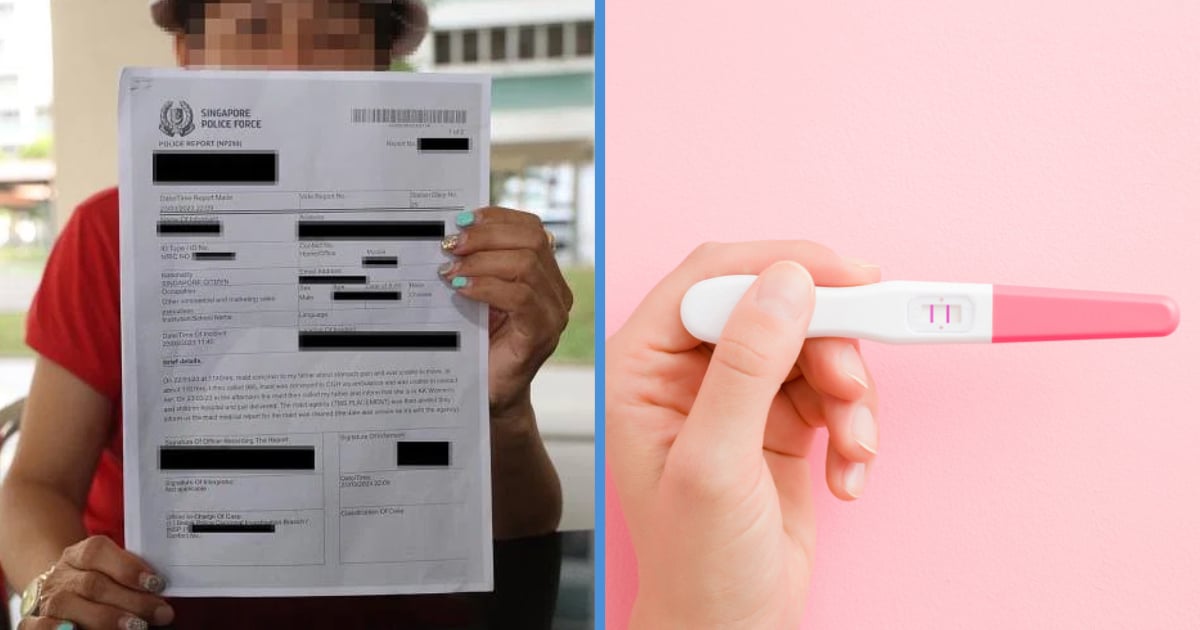Regardless of what point in life you’re at, it goes without saying that a surprise pregnancy would come as a shock to anyone.
Especially if you’re the employer of a foreign domestic worker (FDW) in Singapore.
For the unaware, getting pregnant is illegal for FDWs working in Singapore; their work permits will get terminated if they become pregnant.
But that’s exactly what the employer of an FDW recently experienced in Singapore after her FDW gave birth to a girl five months after the FDW started working for the family.
And what’s even more confusing was that her pregnancy was not detected during her biannual health check-up, a compulsory procedure that all FDWs in Singapore must go through every six months.
FDW Only Started Working for Current Employer in October
When speaking to Lianhe Zaobao, the employer’s wife, Yun Xuejiao (Hanyu pinyin), revealed that her FDW, Renny Anggraeni, started working at Ms Yun’s house on 31 October last year.
Renny, a 37-year-old Indonesian, had been working for another family in Yishun for around three months before that.
Ms Yuna added that based on her records, Renny came to Singapore around June last year.
She also received a notice last December instructing her to arrange for Renny to attend the medical check-up.
As she was busy during that time, Ms Yun told Renny to go for the check-up herself at a clinic in Simei on 19 December 2022.
The test results showed that all was well with the FDW and that she could continue working for her employer.
FDW Complained of Stomach Pain
However, things soon changed when Renny started complaining of stomach pain on 22 March this year, five months after she started working for Ms Yun’s family.
At first, Ms Yun did not think that it was anything serious.
As such, she told Renny to use medicated oil on her stomach and allowed her to rest.
Despite that, Renny’s pain did not subside.
This prompted Ms Yun to call for an ambulance to send Renny to a hospital.
Employer Was Left Extremely Shocked After Hearing the News, Did Not Know About Pregnancy as Helper Was “Larger in Size”
One day after Renny was admitted to the hospital, she called her employer and told her that she had given birth to a girl.
Yup, that’s the plot twist of the century.
To no one’s surprise, Ms Yun and her family were left extremely stunned.
This was particularly due to how no one noticed that she was pregnant at all.
According to Ms Yun, Renny is “larger in size” and often wore loose-fitting clothes, which was why no one picked up on the fact that she was pregnant.
Employer Suspects that FDW Hid Her Pregnancy
With regards to the shocking news, Ms Yun then expressed her suspicion and said that Renny might have hidden her pregnancy from the time she started working for Ms Yun’s family.
Ms Yun also pointed out that Renny had previously given birth in Indonesia, meaning that she would have picked up on any of her body’s physical changes caused by pregnancy.
Additionally, Ms Yun shared that Renny was sent back to her house for the night after being discharged from the hospital as the maid agency refused to take her in.
When Renny returned, she had apparently apologised to her employers and told them that the child belonged to her husband in Indonesia.
As such, Ms Yun believes that Renny got pregnant even before she came to Singapore and that she had kept her pregnancy a secret throughout her time in Singapore as an FDW.
FDW Might Have Tampered With Medical Check-Up
Apart from that, Ms Yun also expressed additional suspicion regarding Renny’s physical check-up results.
In particular, she said that Renny might have tampered with the medical check-up procedures, allowing the results not to reflect her pregnant status.
Ms Yun then mentioned how she regretted trusting Renny too much and allowing her to attend the medical check-up alone.
According to her, she might have been able to find out about Renny’s pregnancy earlier if she had accompanied and supervised her during the medical check-up.
As for what the clinic’s doctor has to say about the incident, the doctor told Zaobao reporters that the clinic’s urine test for Renny showed that she was not pregnant.
The doctor added that it was the clinic’s first time encountering an FDW giving birth after a negative pregnancy test and that they were just as confused.
Employer Paid $2,000 in Medical Fees but Wants Maid Agency to be Responsible
And here’s what happened after Renny gave birth.
The maid agency sent Renny and her daughter to the Embassy of Indonesia in Singapore, which eventually arranged for both Renny and her daughter to fly back to Indonesia on 8 April.
The maid agency declined to comment on the incident and only said that they had concluded the case.
Aside from that, Ms Yun pointed out that Renny’s act of hiding her pregnancy and then giving birth to her daughter in the hospital afterwards incurred over $2,000 in medical fees.
These fees were paid by Ms Yun.
However, Ms Yun claimed that she was also a “victim” and said the agency should be responsible for the medical fees.
Ms Yun also shared that she filed a police report after paying for Renny’s medical fees as she hopes to receive some form of compensation.
Getting Pregnant While Working in Singapore is Illegal for FDWs
When responding to queries from Zaobao, the Ministry of Manpower (MOM) confirmed that it is aware of the incident and has since gotten in touch with both the FDW’s former employer and maid agency to offer the necessary support.
It also revealed that less than 0.1% of FDWs got pregnant in Singapore between 2019 and 2021.
During that period of time, the yearly average of FDWs who got pregnant was around 170.
Apart from that, MOM pointed out that FDWs attend mandatory Settling-In Programmes when they come to Singapore.
These programmes allow them to learn more about their responsibilities, work permit terms and conditions, and information related to getting pregnant while working as FDWs in Singapore.
In particular, FWDs are told that once they find out that they are pregnant, they must inform their employer(s) about the pregnancy.
Other parties, such as the Foreign Domestic Worker Association for Social Support and Training (FAST) and the Centre for Domestic Employees, also offer counselling services for pregnant FDWs.
Employers are Responsible for FDW’s Medical Expenses
Regarding Ms Yun’s displeasure at paying for Renny’s medical fees, Senior Minister of State for Manpower Zaqy Mohamad said in Parliament in 2021 that employers are responsible for all of their FDWs’ medical expenses.
This applies to expenses incurred by illness, accidents, or even events not related to work.
As for employers who are unable to shoulder the cost of their FDWs’ medical fees, they can request financial assistance from social workers at hospitals in Singapore.
However, despite the low rates of pregnancy in Singapore’s FDWs, many of the 0.1% that do end up pregnant end up choosing to risk it all by engaging in illegal means of aborting their fetuses.
The Humanitarian Organisation for Migration Economics (HOME) mentioned to Zaobao that apart from hiding their illegal pregnancies from their employers, some FWDs will seek dangerous ways to abort their fetuses.
In an article published in April this year, a taxi driver in Batam, Indonesia, revealed to CNA that some FDWs in Singapore have chosen to flee to Batam for illegal abortions.
According to information the driver has come across, individuals blend the fetus up in a blender after the abortion to ensure that no evidence is left behind.
Apart from these risky, illegal abortions, some FDWs also look to the black market to purchase pills that induce abortions.
However, taking the pills without proper medical advice or supervision might cause other dire consequences like infections and decreased fertility in the future.
On the other hand, HOME’s spokesperson explained that the organisation is open to helping FDWs who have gotten pregnant or have given birth while working in Singapore.
Once these FDWs seek help from HOME, HOME will try its best to provide them with housing, medical support, counselling and emotional support.
HOME also contacts the relevant authorities to ensure that these FDWs can successfully attain visas for their children before they are sent back to their home country.





